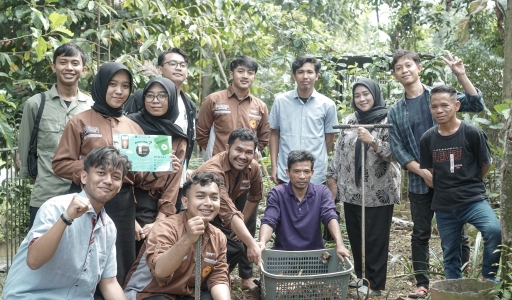Interested to Become a Millennial Agricultural Extensionist? Take a Peek at the Advantages of the Production Technology Study Program and Agricultural Community Development SV IPB University

The number of agricultural extension workers is decreasing. This happens because there is still a view that agriculture is not cool. In fact, in the era of revolution 4.0, agricultural technology is increasingly sophisticated and the role of young millennial agricultural extension workers who are 'literate' in technology is increasingly needed.
The Vocational School (SV) of IPB University has a D4 Production Technology and Development of Agricultural Communities (PPP) expertise program. Restu Puji Mumpuni, SP, MSi, Head of the PPP Study Program (Prodi) IPB University said, the primary competency of graduates of this study program is proficiency in cultivation techniques and the development of agricultural communities.
The initial formation of the PPP Study Program was a request from the West Java Provincial Government. Each year has a capacity of 70 students. Now, the PPP Study Program has also been accredited superior by BAN-PT.
Students get all facilities of the Vocational School (SV) of IPB University, such as production laboratories, fish ponds to greenhouses. The curriculum of this study program includes subjects such as Agricultural Digitalization, Agricultural Mechanization, and Socio-entrepreneurship. A number of these courses so that students are always updated on the latest technology, both in the field of cultivation and social affairs.
Students are also taught by highly competent lecturers. Two of the lecturers hold professorships out of a total of 24 lecturers. Most of the lecturers also have national and international competency certifications.
"To improve competency, students are also included in the Freedom of Learning – Independence Campus (MBKM) internship program such as One Village One CEO (OVOC) MBKM Green Economy Merapi (GEMA). Students are placed in every village in Indonesia to serve and explore village potential and encourage the village economy through innovation in the field of food security," he explained.
"Students not only receive education related to agricultural cultivation techniques but also must be able to conduct agricultural counseling to the community. Students are also given a basic understanding of production to post-harvest handling from upstream to downstream and entrepreneurship," he said.
"The PPP Study Program curriculum is aimed at producing graduates who are competent as agricultural extension workers who are able to master production and community development in three cultivation sectors, namely agriculture, fisheries, and animal science (husbandry)," he added.
In addition, students also have the opportunity to join the Farming for the State Program or Independent Student Entrepreneurship to improve their entrepreneurial skills. The PPP Study Program is also working with the Singapore Ngee Ann Polytechnic to bring in practicing lecturers for summer course activities at SV IPB University.
"PPP Study Program students can even take part in student exchanges to Thailand and Malaysia. There is also an internship program for students abroad at a mushroom company in Japan," he continued.
He continued, the job prospects for graduates of the PPP SV IPB University Study Program were not limited to being agricultural extension workers, but also entrepreneurs, agricultural entrepreneurs, oil palm plantation assistants, and research assistants. Currently, as many as 70 percent of graduates work as extension workers, while the rest work in the private sector.
"Several graduates of the PPP SV IPB University Study Program have worked in Germany and Thailand. He even became an organic farmer as well as a consultant to the Food and Agriculture Organization (FAO). (MW/Rz) (IAAS/Res)



